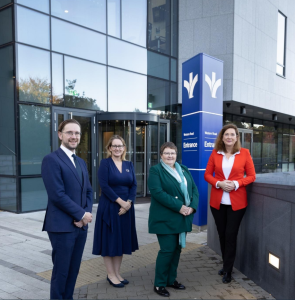Investigating the value of detecting subclinical lymphoedema among cancer survivors
Dr. Conleth Murphy, Dr. Deirdre O’Mahony, Colette Cunningham, Meadbh MacSweeney
Colette Cunningham was awarded with Breakthrough Cancer Research Project Grant, enabling her to conduct research at University College Cork together with Dr. Conleth Murphy (Bon Secours Hospital), Dr. Deirdre O’Mahony (Bon Secours Hospital) and Meadbh MacSweeney (The Lymph Clinic Cork).
Lymphoedema, is a complication of the treatment of many cancers, most commonly breast cancer, colorectal cancer, melanoma and genitourinary cancers. In Ireland, it is estimated that there may be 1,500 new cancer-related lymphoedema cases per year but there is a lack of data regarding the incidence of lymphoedema following a cancer diagnosis. Early assessment and diagnosis of lymphoedema is very important if intervention is to be commenced early to minimise the impact and progression of cancer-related lymphoedema.
This study aims to investigate the value of detecting subclinical lymphoedema to facilitate an early detection, early intervention philosophy; this is known as prospective surveillance. Research has already shown that by using this method, lymphoedema can be detected up to 10 months earlier than by clinical surveillance alone. This means that treatment can be commenced earlier, making a difference to the quality of life to those with cancer-related lymphoedema.
This study will investigate the value of prospective surveillance for those at risk of cancer-related lymphoedema using a the SOZO® device. The SOZO device is the world’s first interactive healthcare device to use ImpediMed’s patented Bioimpedance Spectroscopy (BIS) technology to monitor a person’s fluid and hydration status and body composition accurately measuring the amount of fluid in tissues allowing for even the smallest amount to be detected. The study will investigate the impact of early detection and treatment of lympheodema treatment on the quality of life of those with cancer.
Back
Start year
2021
End year
2023
Principal investigator
Colette Cunningham
Researchers and Collaborators
Dr. Conleth Murphy, Dr. Deirdre O’Mahony, Meadbh Mac Sweeney
Institution
University College Cork
Grant Funding
Breakthrough Project Grant
Linked Breakthrough Research Priorities
Increase research investment into poor prognosis cancers and currently incurable cancers prioritising lung, oesophageal, ovarian, pancreatic, brain, liver and stomach cancers.
Improve integration of cancer research into cancer care in Ireland and increase clinical capacity by prioritising funding for projects and programmes with significant clinical engagement.
Invest in research-led innovation at every stage of the cancer patient journey from first diagnosis through to treatment, clinical trials and palliative care to improve survival and quality of life.










 Contact
Contact